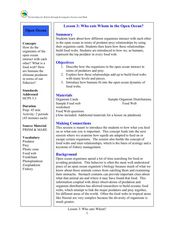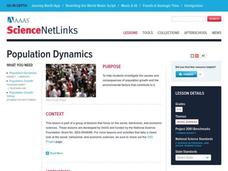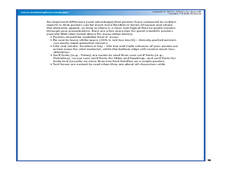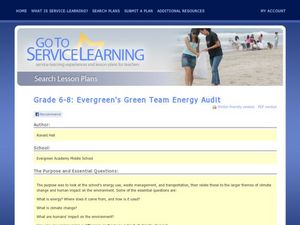Curated OER
Discovering Owls
Students are introduced to different types of owls and owl pellets. They list several adaptations that benefit the owls. Students identify the various species of owl that live in Wisconsin. Students discuss owl pellets and identify the...
Curated OER
Water and Ice
Students observe what happens to water as it goes from a solid to a liquid. In this exploratory lesson plan students gain an understanding for the water cycle while working in groups observing what happens to water as it changes state.
Curated OER
Countdown Calendar
Students create a calendar of endangered species. In this preservation instructional activity, students research endangered species of plants and animals around the Lake Pontchartrain Basin. Students gather facts about the endangered...
Curated OER
Flowering Phenology: How Do Plants Know When to Flower?
Students study the process of plant reproduction and the biotic and abiotic factors that affect flowering phenology. In this plant reproduction lesson, students describe the interaction of environmental factors as it relates to...
Curated OER
Watershed Model
Students view a presentation of water and land and how we need to protect our water resources. In this water lesson plan, students discuss how we rely on water, and complete activities in all subjects related to water.
Curated OER
Results and Conclusions
Fourth graders practice using the scientific method. In this results and conclusions lesson, 4th graders review data collected, create a graph of their data and make their final conclusions about the information collected.
Curated OER
Who Eats Whom in the Open Ocean?
Students examine how organisms interact with one another in the ocean. In this science lesson, students discuss predators and prey in the ocean. Students discuss food webs and how organisms interact with each other.
Curated OER
Legend of the Indian Paintbrush
Third graders discuss the story read to them and explain the legend of the Indian Paintbrush. They study Indian sign language of 4 different topics and create a sentence using the sign lang. they just learned.
Curated OER
Population Dynamics
Students investigate the causes and consequences of population growth and the envrionmental factors that contribute to it. They discuss what they think the world's population will be in 2050.
Curated OER
Genetic Disorders with Cultural Roots: International Insects
Students recognize that certain populations have specific genetic disorders that could benefit or harm them in their environment, work out punnett square problems and infer offspring probabilities from results, and provide advantages and...
Curated OER
Renewable vs. Non-Renewable Resources
Fifth graders, after brainstorming why conservation of resources is important, distinguish between renewable and non-renewable resources. They make a list of different types of natural resources on the board and then sort them into two...
Curated OER
Photosynthesis
Fourth graders discuss and identify the components of photosynthesis and the products of this process. They participate in a class discussion about the importance of oxygen, and in small groups act out the process of photosynthesis. ...
Curated OER
Water and Ice
Learners examine how water changes state, from a liquid to a solid. In this water lesson students study the water cycle and how temperature and pressure effect it.
Curated OER
Advanced Critical Reading - Columbian Exchange
In this critical reading worksheet, students read a short passage about the Columbian Exchange and then answer questions based on the reading. Students answer questions by making inferences, determining author's point of view and use...
Curated OER
What's So Special?
Students study the biology and morphology of Lophelia corals. In this investigative lesson students explain how the coral contributes to communities, and create a poster.
Curated OER
Evergreen's Green Team Energy Audit
Students investigate the ways energy is used at their school and how it can be changed. In this energy lesson, students participate in a service project related to energy. Students record and calculate changes that saved energy and the...
Curated OER
Greco-Roman Origin Myths
Students explore myths that explain the world, recognize some characters of Greco-Roman mythology and their symbols, and Make personal connections to the theme by writing and drawing a myth of their own.
Curated OER
How Can We Locate Specific Places On Earth?
Second graders discover how to use longitude and latitude to locate specific sites on Earth. They compare old and new ways of locating specific places, and discover how latitude and longitude coordinates are used to locate places on Earth.
Curated OER
The Good, the Bad and the Both
Middle schoolers use information from articles about microorganisms and their prior knowledge to identify both the positive and negative aspects of microorganisms.
Curated OER
Invertebrate Research Project
High schoolers keep a scientific research notebook on an invertebrate detailing its behavior and responses.
Curated OER
Conservation 'Ad'vice for National Parks
Learners discuss ways that the public can damage as well as preserve our natural and cultural resources. Small groups are each assigned one of the national parks and must design a poster or TV commercial that celebrates the importance of...
Curated OER
Economic Use of Public Natural Areas
High schoolers examine the public controversy between the use of public natural areas for economic activities by viewing video clips, researching on the Internet, and calculating sustainable land.
Curated OER
Radical Raptors
Students study the lifestyles and habitats of raptors that live in Minnesota. They play games associated with their study.
Curated OER
Mythical Mayhem
Students explore Greek and Roman mythology in this five lessons unit. Common gods, their roles in the myth and stories of the era are surveyed as students take on the personality of a mythical character.

























